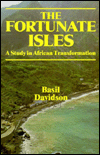The Fortunate Isles
by Basil Davidson. Africa World Press, 1989.

The "Fortunate Isles," a traditional name for Cape Verde, may seem a strange description for a set of dry and desolate islands, uninhabited before they were settled by slaves and their masters, and subject to periodic drought and famines that have driven a large proportion of the population to leave. Yet Basil Davidson, who has traveled extensively through Africa in a long and distinguished career as journalist and historian, finds Cape Verde one of the most hopeful examples in the troubled history of modern Africa.
Much of this book describes the struggle of a small band of rebels to free Cape Verde from Portuguese rule, and to build a new government with broad popular support. The freedom of Cape Verde, like that of the mainland territory of Guinea-Bissau, was the aim of the PAIGC, the African Party for the Independence of Guinea and Cape Verde, which originally intended to unite the two regions in one country. Davidson's admiration for Amílcar Cabral, the PAIGC leader assassinated in 1973, comes through clearly.
Guinea-Bissau was the first to win its independence, after a tough guerrilla struggle described by Barbara Cornwall in The Bush Rebels. In Cape Verde, collaborators with the Portuguese regime and the comfortable middle class feared that "Sancho," a legendary wild man of the hills, would come down "flailing his tail" and wreaking havoc, but in fact the struggle in the islands mostly consisted of building local organizations and holding mass demonstrations. Independence came in 1975, after a rebellion of disgruntled military officers overthrew the Salazar dictatorship in Portugal.
A painstaking process of consciousness raising preceded the independence of Cape Verde. Unlike the countries of the mainland, Cape Verde had no ancient traditions to draw upon: in a sense it was an artificial nation, in which racial mixing had led to the creation of a unique culture of "brown Creoles." Though these Creoles developed a sense of national identity, their initiative was sapped by drought, famine, unemployment, the exodus of many young Cape Verdeans, and the rigid and sometimes brutal control of the Portuguese. Under these circumstances, it took the efforts of Cabral and a small vanguard of rebels to organize an effective resistance.
The political history in The Fortunate Isles will be heavy going for some readers, though intriguing to anyone with an interest in issues of decolonization and development. Still, the narrative is enlivened by Davidson's portraits of rebel leaders and ordinary citizens, and his vivid descriptions of the dramatic mountainous landscape of the islands, including the volcano that makes up the island of Fogo (Fire). Though Davidson takes a warmly partisan attitude to the rebels and the new government of the independent Cape Verde, he is not averse to pointing out the problems that remain to be addressed -- notably the "huge discriminations practiced by Cape Verdean men against Cape Verdean women."
From The Fortunate Isles:
Well above the 1300-metre mark the road tops a shoulder-bone of the volcano and runs for a little space until suddenly it takes you round a cliff-hung corner and throws you into the Place of the Cauldron, Chã das Caldeiras, the vast crater itself.
The moment is worth coming a long way to experience. Before this corner you are on a high peak raised above ocean horizons: perched on a globe-revealing cloud, as it were, and easily able to imagine the whole of humanity out there in front of you. Then you are suddenly inside a monstrous container of gigantic slag that might be the churned-up leavings of a long artillery bombardment: except that what is here is no kind of mud but long-cold lava cast in tortured and fantastic clumps. Beside you the wall of the cauldron climbs sheer and jaggedly to a curtain-ridge 500 feet above, while there in the centre of the cauldron, dripping its petrified rivers of grit, goes up the inner core for another 2000 feet. You stop the car and get out and crane back your head, and still you cannot see the top of this volcano.
"One of these days," says Carlos, "I am going to climb it." The visitor has no such thought.


